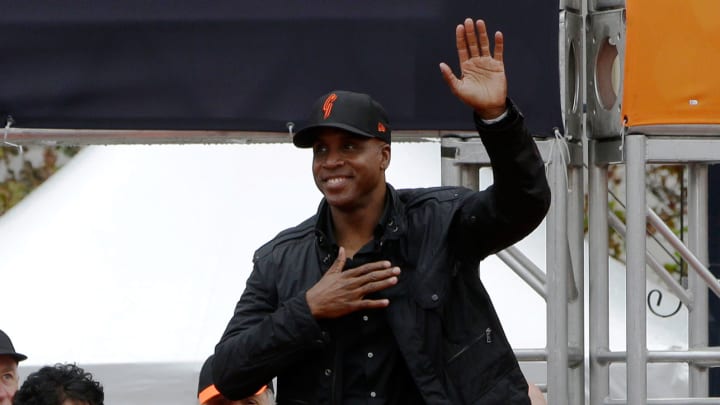The Giants Are Right To Retire Barry Bonds's Number Even if Controversy Awaits

In what might be the most controversial pregame ceremony in baseball history, the Giants announced they will retire Barry Bonds’ No. 25 before their Aug. 11 game against the Pirates, the only other team Bonds suited up for. And minutes after the news went public on Tuesday afternoon, the baseball world once again embroiled itself in the ongoing debate of how to acknowledge steroid users.
For anyone who hasn’t followed the Giants organization closely, the team’s decision to openly endorse Bonds and all the baggage he brings in tow is a surprising (some would say appalling) one. Why would the team celebrate a player who spent the last half of his career dogged by cheating accusations and in and out of court rooms?
But for anyone that’s kept close tabs on San Francisco, this decision really isn’t that surprising. The team has left a very public trail of breadcrumbs that led to this announcement, starting with a formal reestablishment of ties (Bonds was named a special advisor to the CEO last March) and ending with a plaque on the Giants’ Wall of Fame in July.
The Giants’ delicate and deliberate dealing with Bonds finally reached its next phase, and the timing is right—if not overdue—to hang Bonds’ No. 25 alongside franchise greats like Willie Mays’ No. 24 and Willie McCovey’s No. 44.
Yes, it’s surprising for the Giants, an otherwise squeaky-clean organization that’s done everything to distance itself from controversy since Bonds “retired” 11 years ago, to openly champion for the player many perceive to be the poster boy of the Steroid Era. It’s surprising to see the team break its own unwritten rule that it won’t retire a player’s number until they’re enshrined in the Hall of Fame. Even after Gaylord Perry was inducted in 1991, the Giants didn’t retire Perry’s No. 36 until 2005.
It’s surprising to see the Giants venture into these murky waters knowing they’ll alienate 29 other fanbases like Bonds did for years. But that shouldn’t be (and evidently isn’t) their concern. What is likely of concern, and what may have stood as the biggest driving factor to this decision but won’t ever be publicly admitted, is that the Giants were running out of time.
In a terrific piece by Andrew Baggarly of The Athletic, Baggarly depicts an emotional Bonds speaking at a birthday gathering for McCovey at AT&T Park last month.
“(Bonds) ended his remarks by speaking of ‘getting there’ one day,” Baggarly wrote. “He just hoped if that day ever arrived, it wouldn’t come too late for Mays and McCovey to be there to witness it.”
Within the context of that quote, “getting there” refers to the Hall of Fame. But the meat of the point still holds true.
Bonds has always spoken passionately about his lifelong relationships with McCovey and his godfather, Mays. Both have been prominent fixtures around AT&T Park for years, but it won’t be that way forever. McCovey turned 80 last month and is confined to a wheel chair. Mays will turn 87 in May.
In the eyes of Bonds and the Giants, the proper way to publicly celebrate Bonds’ career is with Mays and McCovey in attendance, right alongside Bonds.
Hall of Fame voters have made it clear that if Bonds is making it to Cooperstown, it’s not going to be in the next two or three years. He only garnered 56.4% of the vote this year, with the 18.6% gap a lot larger than it may appear. His best shot will probably come in his last go-around on the ballot in 2022.
Evidently the Giants weren’t willing to chance it and wait that long, which invites the obvious question for San Francisco fans: Why did we have to wait this long at all?
The Twins Finally Have an Open Playoff Window. What They Need Is Starting Pitching.
Without Bonds, the Giants may be playing in Tampa Bay right now. Without Bonds, the Giants’ effort to build their gorgeous waterfront ballpark may have been delayed years longer or not come to fruition at all. Without Bonds’ home run chases and the pennant races he fueled, the Giants wouldn’t be the organizational juggernaut they are today.
For all the storm clouds and negativity that followed most of his career in San Francisco, he’s given the Giants much more than he’s taken. That alone should have merited his number retirement, an honor Bonds earned years before he became entangled in PED controversies.
But it’s never been that simple with Bonds, and it never will be.
The Giants could have continued their game of not issuing a No. 25 jersey because it was “retired” without actually being retired. Fortunately that game has reached its conclusion.
Finally, San Francisco will permanently put No. 25 to rest.
